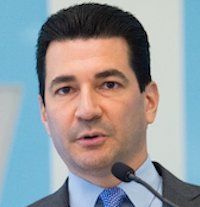FDA Shares Congress-inspired Regulatory Changes
Commissioner Scott Gottlieb, MD, testified the changes that followed the 21st Century Cures Act.

Scott Gottlieb, MD
In a testimony before the US House Committee on Energy and Commerce, US Food and Drug Administration (FDA) commissioner Scott Gottlieb, MD, discussed the administration’s activity in respect to the 21st Century Cures Act.
The Cures Act, enacted by Congress last December, authorized $6 billion-plus in funding for predominately the National Institutes of Health (NIH) for provisions to combat opioid abuse, advancing medical research, and developing drugs.
A supplemental provision from the act was changes made to the FDA Drug Approval process, which expedited the administration’s regulatory procedure for new drugs and devices. Under the act, certain applicants were only required to include data summaries or real-world evidence as part of the product’s submission.
With this implementation, FDA approvals — particularly those for generics — have boomed in the past fiscal year. Gottlieb, who was appointed to his position in May, said the Cures Act is a “defining element” of his own policy planning.
“Congress wanted us to have a strong workforce and policies that will enable the American people to capitalize on the breakthrough science that’s transforming medicine,” Gottlieb said in his testimony.
Along with the reauthorization of user fees, the Cures Act has been responsible for offering the FDA a new platform to advance scientific progression into patient treatment, Gottlieb. He noted that, just 5 years ago, it would have been unrealistic to imagine there being cures for sickle cell disease, hemophilia, or early-stage cancers.
“Such discussions are no longer imprudent,” Gottlieb said. “In fact, we should expect these opportunities.”
The FDA has made its own initiative in extending directives set by the act, Gottlieb said, by adjusting their own policymaking and planning. Such documented plans, which “continue to expand on what Congress set out to achieve,” will be shared soon.
Gottlieb shared one effort already in progress — the exploration of new ways to expedite development and review of products of oncologic targeted medicines. While accelerated approval has been granted circumstantially when there’s a serious unmet medical need, that product’s showing of benefit is often based on its effect on a surrogate endpoint.
“In these cases, that endpoint, like tumor shrinkage, is judged to be reasonably likely to predict clinical benefit,” Gottlieb said.
The FDA might want to approve a targeted drug with an effect on overall survival for a selected group of patients, but it should require a post-market confirmatory study to validate its clinical findings, Gottlieb said. This could mirror an accelerated approval approach.
Though the benefit of this process would be in reaching clinical endpoints, an accelerated approach could often prove valuable. Gottlieb hopes to better define the “intermediate clinical endpoints” by which they can approve products on an accelerated process, as authorized by Congress under the FDA Safety and Innovation Act (FDSIA).
“One reason we’d want to consider accelerated approval in these settings is that it would include authority to require confirmatory evidence to support the continued marketing of the drug and an expedited withdrawal mechanism if that evidence fails to confirm the benefit,” Gottlieb said.
Gottlieb hopes to apply this Cures Act-inspired principle to an approval process for cancer drugs already approved for at least 1 indication. A secondary indication approval process can sometimes rely on a more targeted data set, under the right circumstances set by the FDA.
The FDA will continue to build on the framework of the act.
“Cures (Act) refashioned and modernized FDA’s footprint for enabling new technologies to reach patients more efficiently,” Gottlieb said. “It’s given the agency new authorities and resources to invest in our workforce — it shapes the spirit of our mission.”
Related Coverage
Alex Azar Testifies in First Committee Hearing
Reddit Provides Physicians Opportunity to Educate, Connect
FDA Sets New Opioid Generics Guidelines
2 Commerce Drive
Cranbury, NJ 08512
All rights reserved.